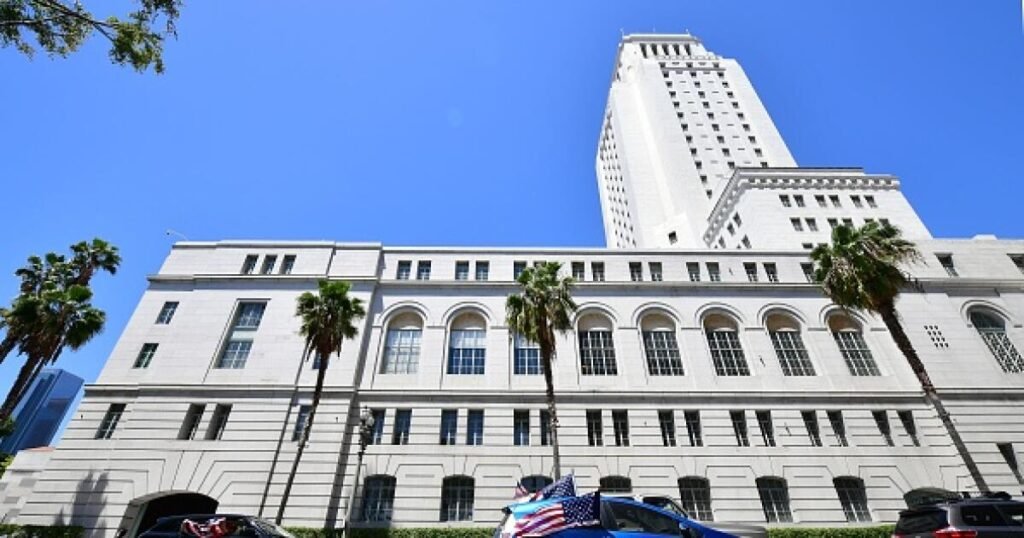Los Angeles Legal Fees Rise Amid Homelessness Issues
Documents examined reveal that a prominent law firm, representing Los Angeles in a recent homeless incident, billed the city $1.8 million for just two weeks of work in May.
The invoices from Gibson Dunn & Crutcher LLP reflect significant legal costs, especially as the city grapples with mounting financial pressures.
With over 15 lawyers charging close to $1,300 per hour, the total has reached nearly $140,000 daily during those 13 days of engagement.
Recently, Gibson Dunn achieved a significant ruling for Grants Pass, Oregon, where the U.S. Supreme Court upheld a law prohibiting homeless encampments in public areas.
In May, Los Angeles officials enlisted the law firm about a week before a critical seven-day hearing aimed at deciding whether to shift control of the city’s homelessness program from Mayor Karen Bass and the city council to other organizations.
In a ruling a month later, U.S. District Judge David O. Carter criticized the city for not following up on a three-year-old settlement with the LA Alliance, which mandates the creation of over 12,000 homeless beds by June 2027.
Judge Carter emphasized that “this is not the time” and handed over control to third parties to manage the city’s approximately $1 billion homelessness initiative.
Matthew Umhofer, representing the alliance, remarked that the hefty payment to Gibson Dunn seemed like an effort to avoid fulfilling legal responsibilities.
“Rather than help those in need, the city is spending this money on legal fees to further complicate the settlement agreement,” he noted.
Records from the City Attorney’s Office indicate that the billing period from May 19 to May 31 encompassed substantial preparation for the upcoming federal hearing, with many days exceeding eight hours of work.
Theane Evangelis, who leads the Gibson Dunn team, raised questions about the bill with the City Attorney’s Office.
Karen Richardson, the spokesperson for City Attorney Hydee Feldstein Soto, stated that Gibson Dunn “did an impressive job addressing critical issues related to the five-year lawsuit,” compressing what would typically take years into a short timeframe.
“We appreciate their assistance and are currently reviewing all expenditures… so we can provide the council with a complete overview of work done and costs incurred,” she added.
The city engaged Gibson Dunn just as council members approved layoffs for hundreds of employees, with the first notifications set to be issued this week.
The council originally earmarked $900,000 for Gibson Dunn over three years, and any costs exceeding this would require advance written approval. However, the firm quickly surpassed this limit, ultimately charging double the agreed amount.
During the seven-day hearing, Gibson Dunn took an assertive approach, challenging many inquiries from attorneys representing the alliance, as well as those from intervening organizations.
Councilman Bob Blumenfield, part of the Council’s Homeless Committee, expressed concern, noting he wasn’t informed that Gibson Dunn’s fees had escalated to $1.8 million so swiftly. He mentioned feeling “not happy” about the situation but would hold off on further comments until he received more information.
Earlier, Blumenfield had co-authored a motion with Councilman Tim McOsker requesting regular updates on the alliance lawsuit from both Gibson Dunn and the City Attorney’s Office.
McOsker, who has experience with the city’s financial matters, also reported that he had not been updated about Gibson Dunn’s substantial bill.
Gilchrist mentioned that her supervisor had solicited regular updates to avoid unexpected legal claims related to the alliance case.
“That’s why council members are pushing for this issue to be discussed in the city council soon, to ensure thorough reporting and review of all costs related to the case,” she stated.
Meanwhile, Gibson Dunn has submitted a notice of intent to appeal part of Carter’s decision, which mandates that third-party monitors review the city’s data concerning housing and camp objectives.
Carter indicated that he might require the city to cover legal fees for the alliance and the homeless advocacy groups involved in the case, as they have already requested $1.3 million to offset expenses incurred since April 2024.
In a recent statement, Gibson Dunn’s attorney Evangelis referred to the judge’s comments about the potential for the alliance to recover attorneys’ fees as a basis for their appeal.
“The city feels it should be investing its resources in direct services for those in need rather than on the alliance’s legal team, especially if the district court dismisses many of their arguments,” she remarked.







